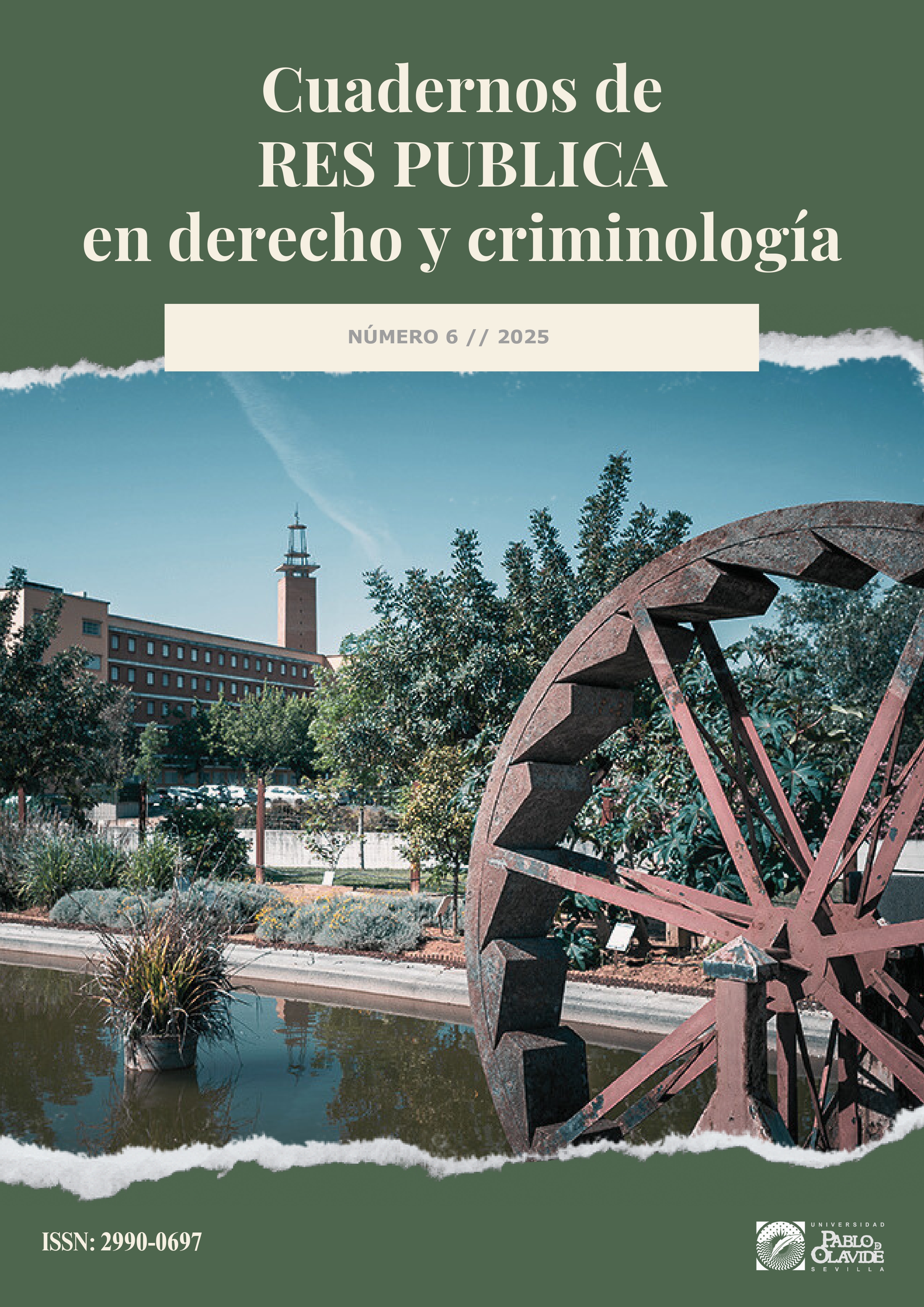The enforcement of criminal sentences in the Spanish military and its adaptation to Article 80 of the Penal Code
DOI:
https://doi.org/10.46661/respublica.12098Keywords:
military criminal execution, military jurisdiction, suspension of the execution of the sentenceAbstract
This paper addresses the adoption of alternative and substitution measures for custodial sentences under the Penal Code to the enforcement of criminal sentences in the military sphere, particularly the suspension of the sentence under Article 80. These measures were traditionally not applicable to those convicted under the Military Penal Code, requiring the imposition of sentences, even if they were short, mostly three months and one day or less than a year. The obligation to serve these short sentences was seen as greater protection of the discipline and specific duties of members of the Armed Forces and the Civil Guard (now restricted to the exercise of their military functions). However, some social and doctrinal sectors questioned their compatibility with the constitutional principle of the humaneness of sentences and their orientation toward reintegration, ultimately generating this regulatory change that we consider more in line with our current rule of law.
Downloads
References
DOLZ LAGO, Manuel Jesús, (2014). De la vida y la muerte: privación de libertad de los enfermos muy graves incurables y algunas patologías jurídicas, Diario La Ley, 8280, Año XXXV, Ed. LA LEY.
ESCUDERO MUÑOZ, Marta, (2017). Los establecimientos penales militares a la luz del nuevo Reglamento Penitenciario Militar de 17 de febrero de 2017 (extraído el 25-05-2025 de https://ficp.es/wp-content/uploads/2017/06/Escudero.-Comunicaci%C3%B3n.pdf).
GARCÍA RIVAS, Nicolás, (2017). Novedades punitivas en el Código penal militar de 2015, en El Código penal militar de 2015. Reflexiones y comentarios, dirigido por De León Villalba, F. J., Juanes Peces, Á. y Rodríguez Villasante y Prieto, J. L, Tirant lo Blanch.
GARCÍA VALDÉS, Carlos, (2012). El derecho penitenciario militar: sus orígenes” Anuario de Derecho Penal y Ciencia Penal, VOL LXV.
MAGRO SERVET, Vicente y SOLAZ SOLAZ, Esteban, (2010). Manual práctico sobre la ejecución penal. Las medidas alternativas a la prisión: suspensión, sustitución y expulsión, Ed. LA LEY.
MESTRE DELGADO, Esteban, (2014). Un ordenamiento doblemente especializado, Revista la Ley Penal, núm. 106.
NISTAL BURÓN, Javier, (2015). La participación de la víctima en la ejecución penal. Su posible incidencia en el objetivo resocializador del victimario” en Diario La Ley, 8555, Ed. LA LEY.
PÉREZ ESTEBAN, Fernando. (1993). El Derecho Penitenciario Militar. Derecho Penal y Procesal Militar. Consejo General del Poder Judicial.
POZO VILCHES, Juan, (2021). La suspensión de la ejecución de las penas privativas de libertad en la jurisdicción militar”, Diario La Ley, Nº 9812, Sección Tribuna,Wolters Kluwer.
ROIG TORRES, Margarita, (2015). Suspensión de la ejecución de las penas privativas de libertad (Arts. 80. 81 y 82)», en J. L. González Cussac (dir.), Comentarios a la Reforma del Código Penal de 2015, Tirant lo Blanch.
SÁEZ MALCEÑIDO, Emilio, (2015). Reforma penal del beneficio de la suspensión de la pena”, Diario La Ley, 8583, Ed. LA LEY,.
SALGADO CARNERO, Manuel, (2020). La suspensión de la ejecución de las penas privativas de libertad en la jurisdicción militar como jurisdicción especializada”, Revista española de derecho militar, Nº. 113-114, págs. 25-63.
SERRANO PATIÑO, Juan Victorio, (2012). El sistema penitenciario español. Premio nacional Victoria Kent. Secretaría General de Instituciones Penitenciarias. Ministerio del Interior.
VEGAS AGUILAR, Juan Carlos y HERNÁNDEZ SÁNCHEZ, Francisco Esteban, (2015). La sustitución de la pena en los delitos contra la mujer”, Jueces para la democracia, 82, marzo, 68-91.
Downloads
Published
How to Cite
Issue
Section
License
Copyright (c) 2025 Francisco E. Hernández Sánchez

This work is licensed under a Creative Commons Attribution-NonCommercial 4.0 International License.




